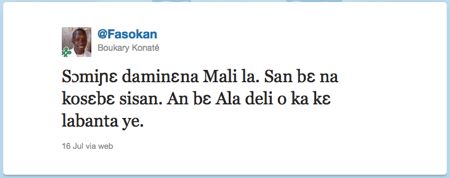The use of the microblogging platform Twitter has become a way for speakers of underrepresented and minority languages all around the world to connect with others from the same language group regardless of geographic distances. Young people have often been at the forefront in the use of these digital tools, which can only help the process to preserve these languages. This trend caught the attention of computer science professor Kevin Scannell from Saint Louis University in the United States. After researching the origins of many of these accounts, Kevin started the project Indigenous Tweets in March of 2011. In the project's blog, Kevin provides some additional background about the project:
Speakers of indigenous and minority languages around the world are struggling to keep their languages and cultures alive. More and more language groups are turning to the web as a tool for language revitalization, and as a result there are now thousands of people blogging and using social media sites like Facebook and Twitter in their native language. These sites have allowed sometimes-scattered communities to connect and use their languages online in a natural way. Social media have also been important in engaging young people, who are the most important demographic in language revitalization efforts.
Some of these examples featured on the Indigenous Tweets site have strong Rising Voices connections. Boukary Konaté, the coordinator of a current Rising Voices grantee project, has especially been involved on this platform for the promotion of the Bambara language. His Twitter account (@fasokan) contains a portion of his Tweets in one of the native languages of Mali.
Another project with Rising Voices ties, Jaqi Aru, from the city of El Alto, Bolivia, arose from an alumni grantee project Voces Bolivianas. Members of this project have been active utilizing the project's Twitter account (@jaqiaru) to tweet in the Aymara language and connect with other Aymara speakers in Bolivia, the region, the extended diaspora, as well as others interested in the language.
Currently the Indigenous Tweets project is tracking 105 languages through the use of Twitter's API to help uncover some of these languages. In this blog post, Kevin explains how the various Twitter accounts are located and tracked:
The site is generated by using a program that “crawls” Twitter users, grabbing the tweets on their timeline and performing statistical language recognition on those tweets (details to come). Then, if a given user has more than a certain fraction of their tweets in the target language, that user's followers are added to a queue to be checked in the same way. […] Of course the program will continue to add new users as they are discovered by the crawler (through random search queries for words in each language) and as they are suggested via the form on each language page on IndigenousTweets.com.
However, new languages and new accounts are regularly being added through personal contact. Some of the users who are featured recommend others who they follow in the same language community. It is this community aspect of the Indigenous Tweets that led to a series of interviews of some of the most active Twitter users in selected language groups. These interviews have been asking the Twitter users about their motivation for tweeting in these underrepresented languages, as well as some of the challenges faced.
In many of the cases, such as the accounts of Boukary and the Jaqi Aru project, the Twitter users being featured are often bilingual or multilingual, which enables them to be important bridge figures in their respective language communities. There is hope that this will encourage others, regardless of where they may live, to connect with others in the same underrepresented language group to preserve and promote these tongues.
Through an emerging collaboration with the Indigenous Tweets project, Rising Voices will be re-publishing some of the interviews. The project shares aspects of our mission to support underrepresented groups in the use citizen media as a way to enter the global conversation. We will also explore other ways that we can support the Indigenous Tweets project, as well as highlight and amplify some of the voices featured in these language communities.






5 comments
It’s great that twitter can help spreading Indigenous languages. However, as you know, tweets become unsearchable after about 9 days, and I am now wondering if there is a way to preserve those Indigenous Tweets, make them searchable, and adds context to them either manually or automatically.
This initiatives sounds great. Where and when an indigenous organization and some other indigenous students could be insert in some project related with this new form of been citizen due to the benefits that brings be in the worldwide?
We are also very interested in this field and see how different groups can utilize these tools, and also eager to see how we can support these organizations and groups.
The question here should be: “Has Tweeter helped them or it has been a new technology, no matter what name it bears?” I don’t think that Tweeter is a particularly good tool in education, in spreading or preserving languages.